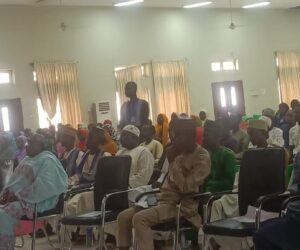In a resounding commitment to educational equity and technological empowerment, OPay, one of Nigeria’s leading fintech innovators, officially unveiled its ambitious 10-year ₦1.2 billion scholarship programme at the Empowering Futures Conference 2025.
The initiative, first announced in 2024, will, over the next decade, disburse funds to support exceptional students across Nigeria’s tertiary institutions annually, covering full tuition fees and enabling uninterrupted academic pursuits.
Held at the Marriott Hotel in Ikeja, the event drew educators, policymakers, students, and industry leaders, marking a pivotal moment in corporate social responsibility (CSR) for Africa’s youth.
The launch, attended by over 500 stakeholders, underscored OPay’s vision to bridge financial barriers in higher education, fostering a generation equipped to drive national progress.

Elizabeth Wang, Executive Director of the OPay Nigeria Board and Chief Commercial Officer, took centre stage during the conference, eloquently articulating the programme’s ethos. “Our vision as a company is to become the most respected and popular company that actively creates social values,” Wnag declared.
“CSR is part of our vision… Education is the future of society, and OPay would like to contribute to the future of society. That’s why we came up with this 10-year scholarship.” Central to the launch was a detailed exposition of the selection process, designed with transparency and meritocracy at its core.
OPay proactively engaged tertiary institutions nationwide, dispatching tailored proposals outlining the partnership’s scope. Institutions expressing interest entered into Memoranda of Understanding (MOUs), establishing collaborative frameworks for student nominations.


Wang emphasised the rigorous, inclusive criteria: “We would like to support the students who are really good and they really need financial support to pursue and continue their dreams.”
Participating schools conduct initial screenings based on academic excellence and financial need, after which OPay’s team verifies eligibility through joint reviews. This dual-layer approach ensures authenticity and equity, preventing any undue biases.
To date, 20 prestigious Nigerian universities have signed on as beneficiaries, including the University of Calabar, Ahmadu Bello University, and the University of Lagos, among others. This network spans public and private institutions, promoting geographic and socio-economic diversity.
In its inaugural year, the programme has already surpassed initial targets, benefiting 420 deserving students with direct disbursements totalling ₦123,000,000.
Funds are transferred straight to students’ accounts, bypassing institutional intermediaries to minimise administrative hurdles.
Wang highlighted the hands-on follow-up: “After we disburse the money to the student directly… we will also call them to say, ‘Have you received it? How can you continue to support your education now?’ We need to ensure that this kind of process is really fair and really benefits the student.”
The launch also spotlighted innovative extensions of the initiative, blending financial aid with skill-building opportunities.
A standout feature is the Cyber Lab support at the University of Calabar, born from a direct appeal by the university’s Vice-Chancellor during MOU negotiations. Leveraging its fintech prowess, OPay is committed to equipping and renovating the facility, transforming it into a state-of-the-art hub for cybersecurity training.
“Our mission is to make financial services more inclusive through technologies,” Wang explained.
“We are the ones leveraging technologies to reshape the whole financial service already. We have the capability… for fast and reliable security, everything we are already so good at technology.”


Beyond infrastructure, OPay pledges annual on-site lectures by its experts, demystifying emerging cyber threats and fintech innovations.
“Every year, we send our team to the school to give them lectures, to let the students know what the latest information is about the cyber technology side,” she added. “What kind of technology do we introduce, what is the impact, so that the students can understand the latest information… And when they graduate, they can join to contribute to this part.”
The immediate impact of the scholarship is palpable. For the 420 recipients, the ₦123 million infusion alleviates tuition burdens averaging ₦292,857 per student and instils hope and agency.
Testimonials from early beneficiaries, shared via video montages at the conference, painted vivid pictures of relief: a medical student from Enugu State described the funding as “a lifeline that turned my deferred dreams into reality,” while an engineering hopeful from Kano credited it with allowing her to focus on innovation rather than survival.
Wang’s quotes resonated deeply, framing the programme as a catalyst for systemic change. “We align internally [that] we want to have the social impact supposed to be the future of the society,” she noted, reinforcing OPay’s role as a proactive architect of progress.
Looking ahead, the initiative’s annual budget, pegged at ₦120 million for 400 students, promises scalability, with potential expansions to more institutions and ancillary supports like mentorship networks.


As OPay celebrates its milestone as Nigeria’s 50th most powerful company, this scholarship aligns seamlessly with its fintech dominance, where over 30 million users rely on its seamless transactions.
By disbursing directly and tracking outcomes semester-by-semester, OPay ensures accountability, with plans for impact audits to refine future cohorts.







